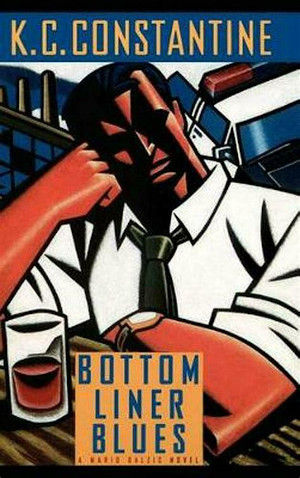As I continued my rereading of all the Mario Balzic novels by K.C. Constantine, in the tenth book, Bottom Liner Blues, I came across something I’d forgotten until seeing it again: a long, long rant about copyright. It annoyed me when I first read it and it did again now. It starts on p. 142 and ends on p. 189. Forty-seven pages of a writer hectoring Balzic about how public libraries are ripping him off. Forty-seven pages of a bad argument from an angry writer who’s created an angry writer character to be his mouthpiece.

The writer character is Nick Myushkin, who appears here for the first time in the series. He’s written nine books. (Remember this is Constantine’s tenth.) Here’s a bit that explains his argument. Balzic, the police chief, has gone out to his house because he’s been shooting his gun in his back yard. Myushkin is dead broke and angry as hell.
“Then what’s your bitch with the libraries? I mean, if they buy your books, what’re you bitchin’ about? Sounds to me like they do the same thing I do, which you just said is okay with you. I buy the book, I read it, I give it to my wife, she reads it, she gives it to our daughters, so what do the libraries do that’s so different?”
“Hey, Balzic, next time you’re down the post office, you know? Turn around and look up at the words on top of the library. It says ‘Rocksburg Public Library.’ ‘Public,’ that’s the word. Man, that’s what changed everything. EVE-RY-THING! That place is supported by taxes. Taxes, get it?”
“So am I! So what? I’ve been supported by taxes all my life, since I got outta high school. I been a marine and I been a cop. Governments have been paying my way since I was eighteen. So what?”
“It ain’t just the fact that taxes pay for the libraries, man. It’s the way the taxes are collected, who pays ‘em and who doesn’t. It’s the fact that a place, a public place—remember the Fifth Amendment? ‘Nor shall private property be taken for PUBLIC use,’ remember that? When you finish readin’ the book, man, and you give it to your wife, and she gives it to your kids, the one thing that ain’t, the one thing that is not, is a public transaction supported by tax dollars—and I don’t care who pays you personally, so forget about where your salary comes from. But when it happens in a public library, man, that’s public use of private property without just compensation, think about it, really, man.”
Myushkin’s argument is about the Takings Clause in the Fifth Amendment to the United States Constitution, the last clause in this:
No person shall be held to answer for a capital, or otherwise infamous crime, unless on a presentment or indictment of a Grand Jury, except in cases arising in the land or naval forces, or in the Militia, when in actual service in time of War or public danger; nor shall any person be subject for the same offence to be twice put in jeopardy of life or limb; nor shall be compelled in any criminal case to be a witness against himself, nor be deprived of life, liberty, or property, without due process of law; nor shall private property be taken for public use, without just compensation.
Balzic is always a good interlocutor, but he’s not prepared to argue intellectual property law or get into first-sale doctrine. I don’t know exactly what an American copyright librarian would say about all this, but I’m sure they would dismiss the argument on legal and moral grounds.
Libraries can lend the books they buy. Every country should have a Public Lending Right that gives a decent income stream to writers based on library circulation of their books, but whether or not they do, libraries can lend the books they buy.
This novel is by far the weakest of the series up to now. Regardless of the content of the forty-seven page argument, it bogs the novel down interminably. The anger about the Gulf War still hits, and Balzic and his wife figuring out how to live with each other now that his mother is dead is compelling, but in the end there is no resolution to the criminal matter that is one of the other main threads of the novel. It’s an angry novel by an angry writer who hasn’t turned his anger into successful fiction.
 Miskatonic University Press
Miskatonic University Press